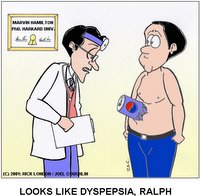
Dyspepsia affects people at any age. It is characterized by the presence of pain in the epigastric area (upper middle part of the stomach). The pain is described as burning, with feeling of fullness in the stomach. Sometimes there is heart burn, nausea and vomiting, and loss of appetite. The stomach normally secretes an acid which aids in the digestion of foods. The esophagus, stomach, and intestines are protected from the adverse effects of the acid because of the presence of a mucus barrier lining the mucosa of the intestinal tract. Sometimes this barrier is damaged leading to irritation of the inner lining of the intestinal tract by the acid. This now leads to ulcer formation and this is one cause of dyspepsia. Another cause can be acid reflux disease. Here, some of the stomach contents which are already mixed with acid propel back up into the esophagus because the valve which should prevent this from happening is not working properly. This causes irritation and the condition is made worse with smoking, heavy alcohol drinking, and eating heavy meals. Anti-inflammatory drugs also play a role in the causation of dyspepsia. This drugs include ibuprofen, aspirin, ketoprofen, and naproxen. Other contributory factors include pregnancy, stress, and anxiety. Presence of other conditions like hiatal hernia wherein there is a defect in the diaphragm, and also Helicobacter pylori which is a bacteria normally present in the mucus layer of the stomach, may contribute to the occurrence of the condition. There are a couple of drugs available to treat the condition like antacids which neutralize the acidity of the stomach, proton pump inhibitors or H2 antagonists which decrease the amount the acid produced. For H. pylori treatment includes use of two types of antibiotic and a proton pump inhibitor. If any of these medicines does not work then endoscopy which uses a small instrument with camera introduced into the mouth to view the insides of the intestinal tract may be used. Avoidance of certain foods, lessening stress, smoking cessation, and eating at least 2 hours before bedtime are some of the lifestyle modifications we can do to avoid dyspepsia. This is a controllable and treatable condition. A lot of self control and behaviour modification improve the condition. |